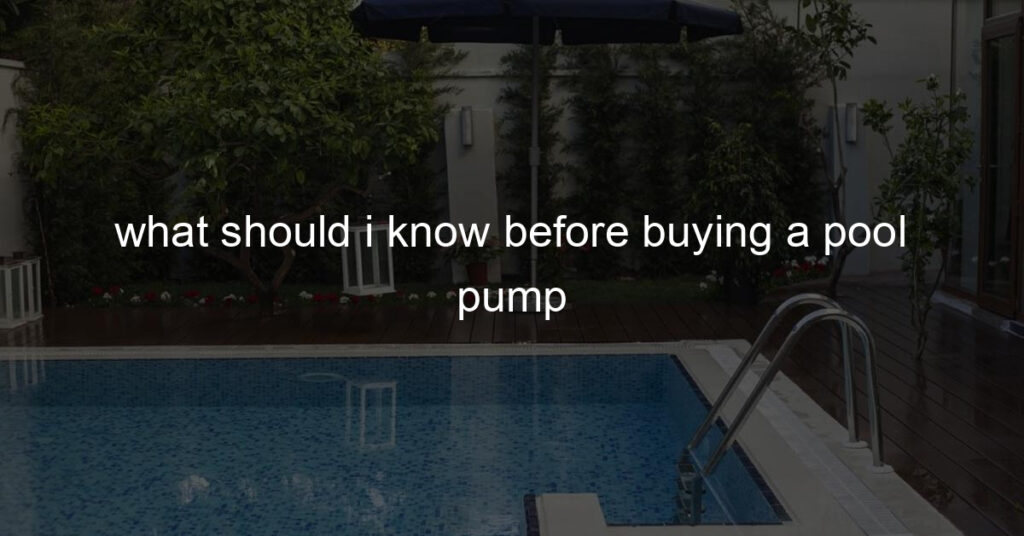What Should I Know Before Buying A Pool Pump
Are you considering buying a pool pump but feeling overwhelmed by the multitude of options available? Before diving into your purchase, it’s crucial to equip yourself with the right knowledge.
In this guide, we’ll unravel the essential factors to consider, from pump size and horsepower to energy efficiency and maintenance requirements.
Whether you’re a first-time pool owner or seeking an upgrade, get ready to make an informed decision that will keep your pool water sparkling and inviting.
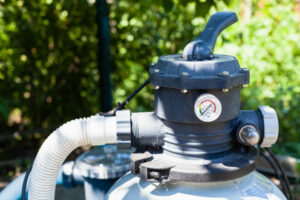
Understanding Your Pool’s Circulation Needs
Proper circulation is vital for maintaining a clean and healthy pool. Before buying a pool pump, it’s important to understand the unique circulation needs of your pool.
Factors such as pool size, shape, depth, and the presence of water features like spas or waterfalls all contribute to the circulation requirements. Larger pools or those with complex features may require a more powerful pump to ensure efficient water movement.
Analyze your pool’s specific needs to determine the optimal circulation capacity.
Determining the Correct Pump Size for Your Pool
Choosing the right pump size is crucial for effective water circulation. A pump that is too small may struggle to adequately circulate water, leading to poor filtration and chemical distribution.
On the other hand, an oversized pump may result in unnecessary energy consumption and increased costs. Consider factors like pool volume, plumbing layout, and the desired flow rate to determine the appropriate pump size for your pool.
Consulting a professional or using online calculators can help you make an accurate assessment.
Evaluating the Horsepower Requirements
The horsepower (HP) of a pool pump determines its ability to move water efficiently. Higher HP pumps are capable of circulating larger volumes of water in a shorter time.
However, it’s important to strike a balance to avoid overspending on unnecessary power consumption. Assess your pool’s specific needs and consider factors like the size, plumbing length, and any additional water features.
This will help you determine the ideal horsepower for your pool pump, ensuring optimal performance and energy efficiency.
Assessing Energy Efficiency Ratings
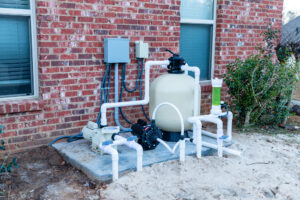
Energy efficiency is a critical consideration when purchasing a pool pump. Opting for an energy-efficient model can significantly reduce your pool’s operational costs. Look for pumps that are ENERGY STAR® certified or have high energy efficiency ratings.
These pumps are designed to consume less electricity while maintaining excellent performance. Investing in an energy-efficient pool pump not only saves money in the long run but also helps reduce environmental impact.
Differentiating Between Single-Speed, Dual-Speed, and Variable-Speed Pumps
Pool pumps come in three main types: single-speed, dual-speed, and variable-speed. Single-speed pumps operate at a fixed speed, typically at high RPMs. Dual-speed pumps offer the flexibility of two-speed settings, allowing for energy savings during slower circulation periods.
Variable-speed pumps provide the greatest level of control, allowing you to adjust the speed to meet specific flow requirements. While single-speed pumps are generally the least expensive upfront, dual-speed and variable-speed pumps offer greater energy savings over time.
Considering the Noise Level and Location of the Pump
The noise level of a pool pump can significantly impact your overall pool experience. Noisy pumps can be disruptive, especially if your pool is located near living areas or outdoor spaces.
When choosing a pool pump, consider the noise level specified by the manufacturer. Look for pumps designed with noise reduction features such as insulated enclosures or rubber mounts to minimize operational noise.
Additionally, consider the location of the pump to ensure it is placed away from areas where noise might be bothersome.
Exploring Pump Material and Durability
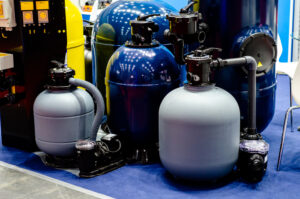
The durability of a pool pump is an important factor to consider, as it can affect the pump’s lifespan and overall performance. Pumps constructed with high-quality materials such as corrosion-resistant metals or durable plastics tend to last longer and withstand harsh pool conditions.
Look for pumps with sturdy construction and positive customer reviews regarding their durability. Investing in a durable pump ensures long-term reliability and minimizes the need for frequent replacements.
Calculating the Total Dynamic Head (TDH) of Your Pool
The Total Dynamic Head (TDH) is a measure of the resistance that water encounters as it circulates through your pool’s plumbing system.
Understanding the TDH is crucial in determining the appropriate pump size and horsepower for your pool. Factors such as pipe diameter, length, bends, elevation changes, and the presence of additional equipment like filters and heaters contribute to the TDH.
Consulting a professional or using online TDH calculators can help you accurately calculate this value and select a pump that can overcome the system’s resistance.
Factoring in the Pump’s Flow Rate and Turnover Time
The flow rate and turnover time are essential considerations when choosing a pool pump. The flow rate refers to the amount of water circulated by the pump in gallons per minute (GPM) or gallons per hour (GPH).
Calculating the flow rate helps ensure proper water filtration and chemical distribution. Turnover time is the duration it takes for the pump to circulate the entire pool’s volume. The ideal turnover time depends on factors such as pool size, bather load, and desired water quality.
Aim for a turnover time of around 6-8 hours to maintain optimal water conditions.
Considering the Cost of Operation and Long-Term Savings
When purchasing a pool pump, it’s important to assess not only the upfront cost but also the cost of operation. Pumps with higher energy efficiency ratings may have a higher initial price but can result in significant long-term savings by reducing electricity consumption.
Consider the estimated annual energy usage of different pump models and compare their operating costs over time. It’s often worth investing in a more energy-efficient pump, as the savings on utility bills can offset the higher upfront cost in the long run.
Examining Pump Maintenance and Replacement Parts
Regular maintenance is crucial for the longevity and performance of your pool pump. Before purchasing, research the maintenance requirements of different pump models. Look for pumps that are easy to access and clean, with readily available replacement parts.
Think about factors like filter basket size, ease of debris removal, and the availability of seals, O-rings, and impellers. A pump with accessible and replaceable parts ensures that routine maintenance tasks can be performed easily, extending the life of the pump and avoiding unnecessary downtime.
Evaluating the Warranty and Customer Support
The warranty and customer support provided by the manufacturer play a significant role in your purchasing decision. Review the warranty terms and conditions to understand the coverage and duration offered for the pump.
Additionally, assess the reputation of the manufacturer for customer support and responsiveness to any potential issues or concerns. A reliable warranty and responsive customer support can provide peace of mind and assistance in case of any unforeseen problems with the pump.
Understanding the Pump’s Compatibility with Pool Filters and Heaters
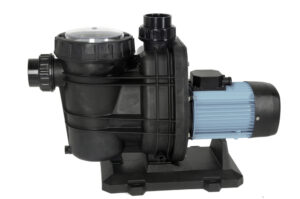
Pool pumps work in conjunction with filters and heaters to maintain clean and comfortable water.
Ensure that the pump you choose is compatible with your existing pool equipment or planned upgrades. Consider factors such as filter type (sand, cartridge, or diatomaceous earth), size, and compatibility with the pump’s flow rate.
Similarly, if you have a pool heater, ensure that the pump can deliver the required flow rate and pressure for efficient heating.
Exploring Additional Features and Technology Options
Pool pumps often come with additional features and technological advancements that can enhance their performance and user experience. These features may include programmable timers, remote control capabilities, digital displays, or advanced diagnostic systems.
Assess the availability and usefulness of these additional features based on your preferences and budget.
While they may add to the upfront cost, they can provide added convenience and control over the pump’s operation.
Seeking Expert Advice and Comparing Customer Reviews
When it comes to selecting the right pool pump, seeking expert advice can be invaluable. Consult with pool professionals or experienced pool owners who can provide insights based on their knowledge and firsthand experiences.
Additionally, read customer reviews and ratings of different pump models to gauge their performance, durability, and overall customer satisfaction.
This combination of expert advice and customer feedback can help you make an informed decision and choose the most suitable pool pump for your needs.
To wrap it up,
buying a pool pump doesn’t have to be daunting!
By considering factors like circulation needs, pump size, energy efficiency, and maintenance requirements, you can make a confident choice.
Remember to think about noise levels, durability, and warranty too. Don’t forget to calculate flow rates, consider long-term savings, and explore additional features.
Seek advice, read reviews, and make an informed decision. With the right pool pump, you’ll enjoy sparkling, inviting water all season long. Happy swimming!

